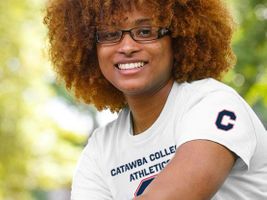"Learn how to find the balance. Understand that this [college] is a stepping stone for the rest of your life," Elaine Pasqua, an advocate for right choices, told Catawba College students on Feb. 14. Speaking in Keppel Auditorium, she encouraged them "to learn to be comfortable with who you are" and to "put your goals first and your academics first."
Pasqua's program, "Sex and Excess: Surviving the Party," helped those attending understand why they engage in high-risk behaviors and how things can go wrong. She did not ask students not to drink, but rather to drink responsibly.
She began her presentation with a primer on alcohol use and abuse, noting that the number one high risk behavior on college campuses is alcohol abuse. She said alcohol dehydrates both the brain and the body and due to how men and women metabolize alcohol, ladies cannot drink as much as guys.
"Your goal should be to drink only one drink an hour," she said, adding that alcoholic drinks should be alternated with non-alcoholic drinks.
Each year, 500,000 college students are injured as a result of alcohol abuse, and 1825 die each year as a result of alcohol abuse, Pasqua explained.
"What I want most for you guys is for you to be a family for each other. Look out for each other – it's really crucial." She said that most campuses, including Catawba, have a medical amnesty policy in place where underage students who seek medical assistance for a fellow student who has overindulged in alcohol will not face charges for drinking themselves.
"College students drink to fit in. I want you to learn to be comfortable with yourself."
Pasqua said alcohol use often leads to sex, but not always "good sex."
"The most underreported crime on campuses today is sexual assault. 97,000 college students are sexually assaulted on campuses each year. So starting today," she encouraged, "each of you are going to be a part of a national initiative called bystander intervention.
"Keep your eyes open at parties and take potential victims of sexual assault to a safe place."
She spoke about the different types of rape, including coercion rape and intoxication rape, while reminding her listeners that "no means no."
To the males in the audience she said, "Always think with your mind and don't put yourself in a vulnerable situation. Keep the brain engaged and think about the consequences. There are dangers of sexually transmitted infections and unwanted pregnancy."
To demonstrate her point, she asked 15 volunteers from the audience to come on stage. Each was given a small cup of fluid and asked to mix their fluid with that of three individuals. When the mixing was complete, Pasqua used a dropper to add a solution to the mixed cups. If the solution turned pink, it indicated the presence of a sexually transmitted disease. Only one student's solution out of the 15 participating remained clear, indicating no sexually transmitted disease.
"The more people we have sex with, the higher our risk of sexually transmitted disease. Remain clear, remain sober, so you can practice safe sex."
She said always using a condom or practicing abstinence were two ways that offer protection against sexually transmitted infections.
"Respect yourself because if you respect yourself enough, others will respect you. Don't take your young healthy body for granted."
Pasqua's presentation at Catawba was sponsored by the Catawba Office of Student Affairs.
;RELATED CONTENT:
PHOTOS: "Surviving the Party" Program
